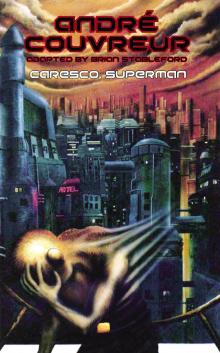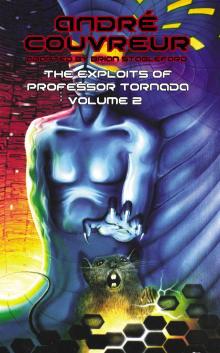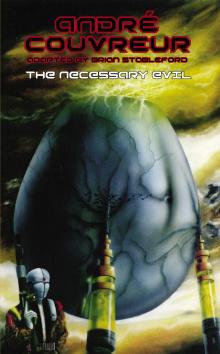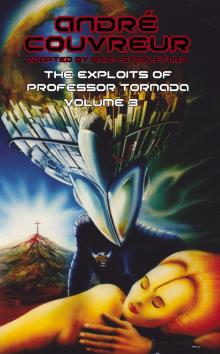- Home
- André Couvreur
The Exploits of Professor Tornada (Vol. 2) Page 13
The Exploits of Professor Tornada (Vol. 2) Read online
Page 13
But I couldn’t do any more. I was out of breath; my legs buckled. Twenty meters from the exit, I fainted in Marcel’s arms.
VII
I came round under the caress of a light wind coming from the sea. I was lying on a bed of moss, protected from the sun by a vault of foliage. The waves were singing softly at my feet. When I opened my eyes, I drank in Marcel’s tender solicitude. After leaving that infernal villa, he had laid me down before nature, in order that nothing would persist of the baneful influences to which I had just been subjected.
“A bad dream...” I murmured.
He caressed my hair. “No, Made, it wasn’t a dream. You’ve just witnessed—in fact, participated in—the most astonishing manifestation of human intelligence. Do you know what that Monsieur Danator—or rather, that Tornada—whom I left back there, tied up, has done? Let me explain it to you. Lie down again, during this little lecture. Hang on, I’ll make a cushion for you with my jacket...”
I let him do it. My confidence in him was reborn. And he talked.
He reminded me of the scientific notion of the origin of life. Human beings had not been created by a wave of a magic wand, as legend pretends, but were the end-product of a long process of evolution, the issue of the sea. What a vast horizon, therefore, had been opened to scientists, in creating their osmotic growths, and how plausible the concept he became of a slow organic perfection over thousands and thousands of years...
Yes, those scientists had recommenced creation; but they had remained in the first phase, they had only given birth to inferior creatures, because they had been unable to develop their creatures in the same physical conditions that had, at the moment when our globe emerged from chaos, produced influences favorable to the evolution of life. In nature, as in all things, time had acted; it had permitted matter to extend its action as far as the type, still perfectible, of modern humankind; the latter had only been the end-product, the final stage, thus far, of the organizing work of matter and force...
What, then, was surprising in the fact that a brain like that of Tornada, who also had an immense surplus of capital at his disposal to serve his inventions, would one day take over the work of Leduc and others, and reconstitute the primal environment, in order to recapitulate in a few years the millennia-long work of speciation, and end up, at the final count, with the osmotic growth of a human being...
“So, then…Adam…?” I gasped.
“Was the first citizen not to have emerged from a woman’s loins.”
I was frightened. He undoubtedly understood my emotion. He had the skill to reassure me completely regarding the integrity of his mind, and to go on, coloring his argument with the slight levity that normally characterized his discourse.
“Don’t look at me like that, Made. I still have all my meninges. Come on, we’ve only just left those Lilliputian forests, that Court of Miracles, at the end of which you found a second specimen of the Adam series…with one component less—a component, in fact, of dubious utility…for that was the failing of Papa Danatornada, to imagine that he could, just like that, en cinq sec…let’s say, rather, en cinq humide26…yes, the duration of a kiss…perpetuate his primitive type with a pretty girl like you, finished with minute care by centuries of civilization. Good God, what would have resulted from it? What hybrid of the laboratory and nature? Fortunately, he made ‘white cabbage,’ as the author of the callow and incompetent youth in question howled in his despair...”
I blessed him for turning those horrors into a joke. He thus diminished, in my consciousness, the taste that I had acquired at certain moments...
Yes, I got to the point of being able to pity myself, in the name of those poor little guinea-pigs on which scientists carrying out all sorts of crimes. Like them, I had been physiological evidence. In the domain of responsibility, I was no more at fault than those sacrificed innocents. That assimilation cleansed me...
“Yes,” I murmured, “now that I think about it…but what a genius that Tornado is! Not only to give human form to a chemical combination, but also to endow it with a thinking brain, active and purposeful...
“Stop there. Let’s not exaggerate. The thing is prodigious enough already. No, Adam no more had a brain than…the rest.”
“But he spoke, he expressed ides, he composed verses…!”
“With his father’s brain! By the transmission of thought! His own encephalum was no more than an intermediary, devoid of its own vibrations; with, at the most, the rudimentary connection of its petty filaments, the neuromes27 that are the propagative agents of thought. Furthermore, the paternal effluvia of intelligence could not be transmitted over a distance greater than fifty meters. Do you recall the evening of our dinner at Ascain, when he measured the distance because Adam could no longer perceive them? He pretended that he wanted to buy the establishment—oh, but we were the ones who bought it!”
Light was progressively dawning in me. I reviewed my intimacy with Adam, his intervals of cerebral neutralization when, in fact, his father was distracted, notably in the course of the bullfight, and also the whimsical quality of his language, the equivocal nature of his suggestions, his medical-studentesque lectures, always belied by the placidity of his visage...
“So,” I said, “when Adam murmured amorously to me...”
“It was his papa.”
“And when he went further...”
“His papa!”
“Zut!... Zut!”
Yes, zut! It was one thing for the guinea-pig to have fallen from grace with the automaton, so young, so esthetically pleasing, so radiant…but to think that one has weakened for the gratification of a simian individual with unforgettably indecent manners, really is a singular poke in the eye! Zut! My initiator, my divine marquis, was, in fact, nothing but a manufacturer of biogenetic products, a kind of dabbler in human mud. How shameful! How shameful!
However, by virtue of an entirely feminine change of tack, my scorn for myself was immediately converted into anger against the man who had divined all these debasing improvisations and had allowed them to be executed.
“You’ve handed me over to an automaton, you’ve allowed me to be intoxicated and yet you claim to love me!”
Far from bowing his head—on the contrary, proudly—Marcel retorted: “Is it you, Made, who’s reproaching me for having sacrificed my love to the truth? For having wanted to observe, at the expense of my heart, the exact point to which Tornada had brought his artificial creature? Was it not my duty as a scientist? Know that it was also my torture!”
“And what about your morality? Oh, that’s proper!”
“There are no crimes before science!”
His faith won my indulgence.
“Well, let’s suppose that I forgive you…let’s suppose that I come back to you, that I marry you: would you not retain the memory of my profanation? Would it not inhibit the perfect harmony of the union to which I might lay claim?”
“No!” he said, forcefully. “No, because I would accuse myself of being its author! I am, you see, Made, too hard-working to understand women very well, but I know that many of them, before giving themselves to found a domestic hearth, have not been spared to amour. All the better, then, that for you, the damage is restricted to the familiarities of an osmotic growth. Come on, Made, let’s go back together, now, into life…into the life that will, precisely, permit us to prolong the species, by means of the love of a true husband for a true wife!”
“And six million to buy the baby-linen,” I could not help adding.
The honorarium of an experiment in biogenesis! In fact, it wasn’t too badly paid; the little guinea-pig could be content! I had that capital to offer Marcel, and by virtue of a fortunate “white cabbage” I also had my other capital to offer him.
Come on! The sun was resplendent, the birds were singing; everything was conveying healthy effusions. I took my friend’s arm, and without committing the imprudence of Lot’s daughters, who, as everyone knows, were turned into pillars of salt
for having looked back upon forbidden pleasures,28 desalted and yet still immaculate, I abandoned without a backward glance the Villa of the Immaculate Conception, where my statue of salt had liquefied.
The Frappart-Laricarière flirtation, whose path we crossed at that moment on the road, certainly did not suspect that my companion was bringing me back to her normal social destiny someone who had, in one day, passed through the following phases:
Mademoiselle Made Ribaire at ten a.m...
Wife of Adam Danator at eleven...
The Widow Osmosis at four p.m...
Nevertheless still a virgin, and fiancée of Marcel Germaud at about five-thirty...
And promising herself, in the last respect, a copious and authentic revenge for the white cabbage...
THE MEMOIRS OF AN IMMORTAL
Chapter 1
My friend Professor Tornada finished ausculating me and said: “You can get dressed. I’ve just examined you from head to toe; there isn’t a single region of your anatomy that I haven’t palpated, tapped, measured and even radiographed. You’re as healthy as the human stupidity that, according to Renan, is the only thing that gives an accurate idea of infinite resistance.29 It’s extraordinary that at fifty years of age, you show such a defiance of decrepitude. You’ll bury all the minus habens30 who’ll probably be electing you to the Académie in three days time. Get dressed.”
One always has some hesitation in accepting as gospel the diagnosis of a comrade of one’s youth, even one who has become what is popularly known as a prince of science and has acquired a worldwide reputation. One cannot forget that he has often shown himself before you to be vulnerable to error and accustomed to joking. One also wonders whether he might be hiding the truth charitably. In brief, one has good reasons for not believing him, especially when one is experiencing—as I had been for some time—a whole spectrum of real indispositions.
But Professor Tornada was a scientist of exceptional quality. A prodigious surgeon, he could turn you transform you completely, in physical terms, with the mastery of a conjurer. And extraordinary biologist, he had discovered a method of increasing or decreasing at will the size of organisms hitherto considered immutable. Then again, he was perfectly conscientious, albeit so independent that he had been placed under a ban by the Faculté. His title of professor was, therefore, unofficial. He was also very wary about sharing his inventions with his pupils. He always worked alone, in the secrecy of his laboratory. He had scorned honors and became angry when anyone called him “master.” And yet, he had an immeasurable pride and ambition. Like all megalomaniacs, it was to others that he attributed his own delusions of grandeur.
His physique corresponded well enough with his mentality. He had a bony visage, as if carved by a satirist, draped with rough skin, with pointed ears and little bird-like eyes in perpetual vibration. His face was agitated by incessant tics, which a long bushy beard was unable to mask. It was, in sum, the head of a superior degenerate, truly disquieting, and with that, planted on a silhouette so frail in appearance that one wondered how it obtained the strength necessary to do the work of dissection, and by means of what fluid it inspired the confidence of those who had to rid themselves of an impropriety of nature.
I had known him in my youth in the Latin quarter, when, abandoning my doctoral studies in law, I had ventured into literature. In the beginning, my interest in psychology had played a much greater role in bringing me toward that extraordinary individual than any veritable sympathy. In a novel, I would have made a Balzacian protagonist of him. He seduced me and frightened me at the same time with the amplitude of his conceptions on everything touching science and sociology, and because, underneath the florid wildness of his intellect, I discovered the roots of a certain common sense.
He was inventive—unhealthily inventive, insofar as genius falls into the realm of pathology. Very laborious, the dawn often caught him at his work-desk. But he also had needs for release that surpassed the normal. He appeased them in the fields, disappearing for months on end. His enemies, who were the generality, took advantage of it to charge him with the worst calumnies. Some of them said that he was locked up in a madhouse; others affirmed that they had encountered him in infamous company; yet others said that he was in prison. But I, who knew the scientist’s purity of morals and prudence, never doubted that he would turn up again some bright morning, renewed by rest, more ready than ever to continue his intellectual conquests; with the result that, after having thought that I might study him for use in one of my future works, as a character in an amusing fantasy, to which I could attribute the extravagance of his imagination and the crudity of his language—quite shocking for the delicate writer I was striving to become—I had been obliged to recognize that it was rather him who was looking down on me with his alarming cerebrality.
For his exceedingly rare friends, however, he retained a heart of great sensitivity, capable of devotion and sacrifice. He revealed it to me in circumstances where I least expected to find him, and it was those testimonies that convinced me not to interrupt our relationship, even though he was a scientist and I was a poet. He remained a familiar presence in my house. He was my witness at my first marriage, and offered himself as godfather to Ninette. Finally, he brought me the aid of his science—impotent, alas—and his affection, when Emeline succumbed to the epidemic of influenza that ravaged the world concurrently with the Great War. He did not even desert my hearth when, two years after Emeline’s death, I contracted a second union with Lucienne, of which he disapproved. He remained our assiduous commensal, and continued, as in the past, to spoil his goddaughter.
I had, therefore, no reason, either by virtue of the quality of my examiner or the attentive study that he had just made of me, to doubt his optimism.
I insisted, however. “I’d like to believe you, Tornada. I’m sure that if you’d found some organic flaw in me, your amity would have commanded you to inform me of it right away and rid me of it thereafter—inasmuch as one always has affairs to put in order for the future of one’s loved ones.
“That’s true,” he said, suddenly interested. “But you’ve already made your will?”
“I might have to make a few modifications to it.”
“Well, you’ll have plenty of time to think about that.”
“Good. But all the same, at the end of the day, I feel what I feel, damn it! Come on, when I have pains here, in the heart, you can’t tell me...”
“Treat them with scorn, your pains.”
“And the stomach aches?”
“Dispatch them with a glass of cognac, your stomach aches.”
“And those shooting-pains that traverse my liver?”
“Your liver! Ha ha! Your liver!”
He burst out laughing, further scattering his Olympian beard. I feared one of those ludicrous retorts that made me jump. I saw myself being obliged, in the course of these memoirs, for the sake of the fidelity of the story, to the excessively frequent reportage of a language of which my pen, sharpened for the Académie, would not approve. I leave to Tornada the pettiness of pretending that it’s a goose-quill.
But he calmed down. “Your liver! No, no…your liver, I can assure you, has nothing wrong with it—as masculine as could be. As for the feminine, that’s something else...”
“I don’t understand.”31
“It’s your faith that’s afflicted.”
“My faith in what?”
“Well...” He made a gesture to indicate that we understood one anther perfectly, but he specified it anyway. “You understand, my antique, that at our age, over fifty, it’s scarcely prudent to marry a young woman. Your Lucienne is twenty-four. That’s more than twenty-five years difference. It’s too much. Marriage, you see, is like a team of horses. One doesn’t hitch a young mare and a worn-out stallion to the same carriage. No, you’d have done better to remain, like me, in the harness of celibacy.”
“That’s several times…tell me, do you, by chance, suspect Lucienne…?”
I looked at him profoundly, seeking to find in his attitude a revelation of the attacks that had been tormenting me cruelly for two months.”
Every morning, in my mail, I fund an anonymous letter informing me that my wife was betraying me—an accusation as stupid as it was implausible. You might object that it is necessary not to swear to anything where Venus is concerned, and that it is neither stupid nor implausible to attribute a superabundance of altruistic sentiments to a woman who once worked in the theater, but I had studied Lucienne for some time before marrying her, when she had been my interpreter in Artemisia, Queen of Halicarnassus,32 a great lyrical drama in five acts, which was performed at the Cercle Ésotérique. I can affirm, with my hand in the fire, that she was as irreproachable in her corporeal conduct as in her sentiments. There exist, moreover, certain proofs of good conduct that a man of fifty, who has known life, does not mistake on his wedding day, and I had obtained them in their integrity. Since then, confident in the evidence of the debut, I had had no suspicion of Lucienne. And I would similarly swear that she observed in our drawing room the virtues that she maintained in the theater.
I therefore threw those cowardly missives into the waste-paper basket without reading them. But my unknown correspondent must have assumed the use that I would make of them, for, in order that the accusation would reach me nevertheless, he used ruses so varied and unexpected that I wondered at that moment whether they might be due to the subtlety of Tornada. Once, the prose of an unknown female admirer reached me, heaping praise upon me. I read it through to the end, tickled in my self-esteem, but the last sentence, appropriated from the poem in which it was in question, advised me to look to my wife. On another occasion, it was from Rumania that a request arrived to translate one of my works. I was getting ready to agree to it when the contract for the translation offered me, like Diana, the advice to take a mirror and smile at the horns I wore, thicker than my laurels.33 Another time, it was a minutely itemized bill from a plumber. I immediately went to the total, where I found, instead of a figure, the word “cocu.” It is an old French word34 employed by Molière and also by Rostand; nevertheless it was extremely disagreeable to find it being attributed to me. The next day, cut out from a book and stuck on a blank page was the single title: Sganarelle.35 And so on: a pinprick every day, which, without eroding the confidence that I had in my intangible Lucienne, nevertheless ended up annoying me and spoiling the intoxication of soon entering the illustrious company.

 Caresco, Superman
Caresco, Superman The Exploits of Professor Tornada (Vol. 2)
The Exploits of Professor Tornada (Vol. 2) The Necessary Evil
The Necessary Evil The Exploits of Professor Tornada (Vol. 3)
The Exploits of Professor Tornada (Vol. 3)